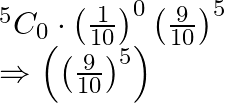(i) Using Bernoulli’s Trial ![]() Success
Success ![]()
![]()
The probability of success, i.e. the bulb is defective ![]()
![]()
probability of that no bulb is defective piece=
![]() defective items
defective items ![]()

(ii) Using Bernoulli’s Trial ![]() Success
Success ![]()
![]() and
and ![]()
The probability of success, i.e. the bulb is defective ![]()
![]()
probability of that there are exactly 2 defective pieces=
![]() defective items
defective items ![]()

In a box containing 60 bulbs, 6 are defective. What is the probability that out of a sample of 5 bulbs
(i) none is defective
(ii) exactly 2 are defective
(i) none is defective
(ii) exactly 2 are defective
In a box containing 60 bulbs, 6 are defective. What is the probability that out of a sample of 5 bulbs
(i) none is defective
(ii) exactly 2 are defective
(i) none is defective
(ii) exactly 2 are defective
